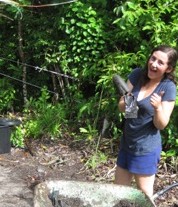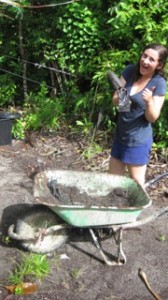“They esteem farming as both a practical art and a spiritual discipline”
On a NOLS Semester in the Rockies, I found myself surrounded by the most picturesque scenery I’d ever seen. The thing was, it was aesthetically overwhelming. It sounds strange to say, but there almost a surplus of beauty—the grass was too green, the alpine lakes too aquamarine, everything flawless and therefore somehow false to my eyes. Maybe it’s not so different from industrial agriculture’s overabundant and unnaturally “perfect” crops. In retrospect, it’s also surprising to realize that the most poignant moments that I experienced in the Western wilds happened to me in the desert, a place that we often see as barren and lifeless. Yet I was intensely moved by the desert, and not alone in this sentiment—Antoine de Saint-Exupéry’s famous protagonist agrees in The Little Prince: “I have always loved the desert. One sits down on a desert sand dune, sees nothing, hears nothing. Yet through the silence something throbs, and gleams…” What I took away from my short time in canyon country was the reassurance that there’s no single “right” interpretation of Eden. It doesn’t have to mean some far-removed and incredibly lush Garden. Somehow, I had fallen for a place that might be considered classically “ugly” with its spiny cacti, thick-skinned creatures, and endless (arid) soil. This is why I think farming’s emphasis on the soil beneath our feet is so important—it forces us to locate our small selves in a single place within the context of the larger world. Ultimately, it makes us appreciate even the smallest signs of life as evidence of beauty. My backcountry adventures impressed upon me the old saying that sometimes, less is more…meaning that farmers can be just as spiritual through the simplicity of soil as someone who grapples with the complexity of organized religion.
Although the spiritual often has “lofty” associations because we tend to think of the afterlife as located above, I’m becoming more convinced that spirituality is strongest when it grounds us. Is so-called “soul-searching” an oxymoron if what we search for—some hidden aspect of our identity—has been intrinsic to us all along? Spirituality should not be a journey that draws us further away from ourselves towards an anticipated and distant end, but rather brings us closer to home in the here and now. I think it could be said that our spirituality ultimately lies in the soil that cultivates our personal growth as much as any plant. Wendell Berry’s praise of the Amish ability to “esteem farming as both a practical art and a spiritual discipline” rings true to me, though I’m neither Amish nor religious in the traditional sense. Some might accuse Berry of romanticism, but I agree with his belief that the intimacy of family farming is a kind of spirituality. The small-scale farmer has a self-awareness that modern agribusiness lacks, simply because the latter is mechanized. Machines may shorten the tedium of repetitive tasks that “inefficient” manual labor prolongs, but ironically, I think there is meditation in the monotony of working with one’s hands. When you think about it, just as a churchgoer folds his hands in prayer, the farmer “supplicates” to the soil. Farm rituals are religious rites. The farmer performs each daily chore as an act of faith that the soil will reward diligence with the miracle of metamorphosis, the moment when small, vulnerable seeds sprout and flourish.
At some level, there seem to be uncanny similarities between “conventional,” churchgoing religion and conventional, modern agriculture. It could be argued that both are “institutionalized” in the sense that they adhere to a set of standards, whether it’s observance of the Sabbath or a certain production quota (in contrast, subsistence-based family farms are less likely to resort to rigid numbers-crunching). Corporate agriculture calls for the consolidation and aggregation of resources, time, and personnel. Conventional religion congregates people and “preaches to the “choir.” In a literal sense, farmers do not fit the “pure” standards of religion. They do “dirty work” in every sense. Their thankless, tedious tasks are unromantic, but make them the backbone of America. What’s more, they engage in labor that others are reluctant to undertake. Yet society shows a double standard because it doesn’t glorify farmers like it does soldiers (for instance), both of whom make significant sacrifices for the greater good.
The point that I mean to make from drawing these parallels is that we’ve become too narrow in our belief system, be it theistic or agricultural. What constitutes official “religion” and what we might call “official” farming—the grossly over-productive operations valued over small farms because they enhance America’s overall economic prosperity, rather than enable only a single family’s survival—are more stringently defined than ever before. Somewhere along the way, we’ve allowed a puzzling hypocrisy to evolve. Here in America, where individualism is supposed to be sacrosanct, the farmers who still sow, till, plow, and harvest by hand are somehow seen as “behind the times,” maybe even “backwards,” even though their direct connection to the soil instills them with a unique knowledge of nature (the terroir of their farm) and awareness of their individual identity in relation to the land. It seems that we’ve stigmatized spirituality as a selfish pursuit, a claim that the subsistence farmer “substantiates” when he produces only for himself. But that’s so utterly untrue when we think about the ethics of smaller, more sustainable farming and its invisible implications. We fail to account for this type of farming’s close ties to wildlife, ecosystems, and neighbors, all of which benefit in ways that may not be monetary, but are most definitely holistic, eco-friendly, and enduring. The relationship between neighbors who have mutual respect for each other’s farming practices epitomizes the priceless social capital of small agriculture, something that can’t be quantified—at least in how agribusiness measures success. So in fact, the spirituality of the small farmer is selfless. Maybe it’s time to rethink the symbolic hierarchy of life, so that we start to see soil just as “heavenly” or “high” as the sky.


